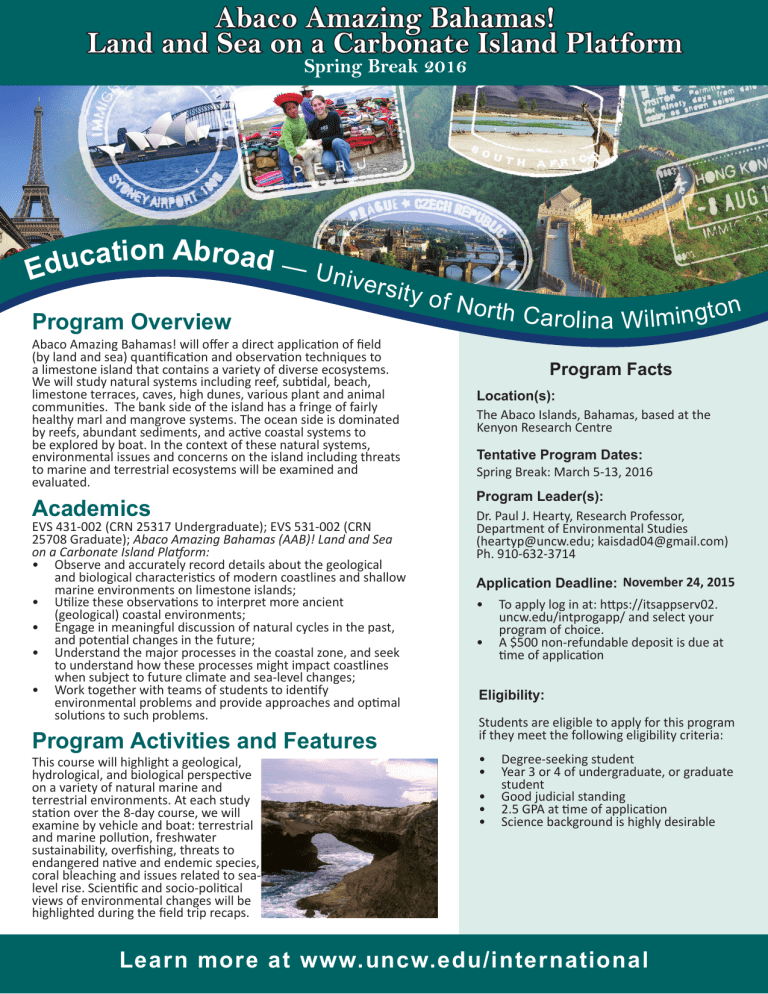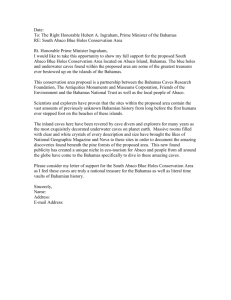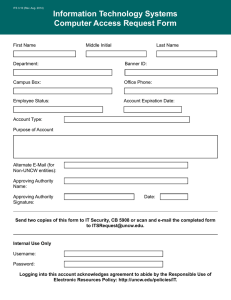Abaco Amazing Bahamas! Land and Sea on a Carbonate Island Platform Educati
advertisement

Abaco Amazing Bahamas! Land and Sea on a Carbonate Island Platform Spring Break 2016 ation Abroad — c u d Unive E rsity of Nor th Carolina Wilmington Program Overview Abaco Amazing Bahamas! will offer a direct application of field (by land and sea) quantification and observation techniques to a limestone island that contains a variety of diverse ecosystems. We will study natural systems including reef, subtidal, beach, limestone terraces, caves, high dunes, various plant and animal communities. The bank side of the island has a fringe of fairly healthy marl and mangrove systems. The ocean side is dominated by reefs, abundant sediments, and active coastal systems to be explored by boat. In the context of these natural systems, environmental issues and concerns on the island including threats to marine and terrestrial ecosystems will be examined and evaluated. Academics EVS 431-002 (CRN 25317 Undergraduate); EVS 531-002 (CRN 25708 Graduate); Abaco Amazing Bahamas (AAB)! Land and Sea on a Carbonate Island Platform: • Observe and accurately record details about the geological and biological characteristics of modern coastlines and shallow marine environments on limestone islands; • Utilize these observations to interpret more ancient (geological) coastal environments; • Engage in meaningful discussion of natural cycles in the past, and potential changes in the future; • Understand the major processes in the coastal zone, and seek to understand how these processes might impact coastlines when subject to future climate and sea-level changes; • Work together with teams of students to identify environmental problems and provide approaches and optimal solutions to such problems. Program Activities and Features This course will highlight a geological, hydrological, and biological perspective on a variety of natural marine and terrestrial environments. At each study station over the 8-day course, we will examine by vehicle and boat: terrestrial and marine pollution, freshwater sustainability, overfishing, threats to endangered native and endemic species, coral bleaching and issues related to sealevel rise. Scientific and socio-political views of environmental changes will be highlighted during the field trip recaps. Program Facts Location(s): The Abaco Islands, Bahamas, based at the Kenyon Research Centre Tentative Program Dates: Spring Break: March 5-13, 2016 Program Leader(s): Dr. Paul J. Hearty, Research Professor, Department of Environmental Studies (heartyp@uncw.edu; kaisdad04@gmail.com) Ph. 910-632-3714 Application Deadline: November 24, 2015 • • To apply log in at: https://itsappserv02. uncw.edu/intprogapp/ and select your program of choice. A $500 non-refundable deposit is due at time of application Eligibility: Students are eligible to apply for this program if they meet the following eligibility criteria: • • • • • Degree-seeking student Year 3 or 4 of undergraduate, or graduate student Good judicial standing 2.5 GPA at time of application Science background is highly desirable Learn more at www.uncw.edu/international Open up yo ur w orld - Go Abroad! Cost Estimated Program Fee: ~$2,150 Program Fee Includes: • Airfare • Accommodation • Local transport by vans and boats Location Abaco Island is one of the largest (~150 km x <1 to 15 km) among 700 islands of the Bahamas archipelago. The limestone islands are situated about 300 km east of south Florida, and offers a unique natural laboratory and human setting for the study of natural and environmental processes. The Abacos (https://en.wikipedia.org/ wiki/Abaco) contain a diversity of marine and terrestrial ecosystems, spectacular geology in an oceanic island setting. Locations to be visited: Kenyon Research Centre and Marsh Harbour town (walk about), Saw Mill and PITA Caves, Elbow Cay, The Marls, West Marsh Harbour, Pine forest and endangered Abaco Parrot. We will also visit Crossing Rocks and Hole in the Wall and have boat days where we will snorkel in the coral reefs, see the Green Turtle Cay environs and Great Guana Cay. Additional Costs: (not included in program fee) About $600 for: • Food • Tourist tax • Park entry Financial Aid & Scholarships Federal and state financial aid may be applied toward this program. Even if you are normally ineligible for financial aid, you should submit a financial aid application (FAFSA). You may find that you are eligible for additional funding. UNCW students may also apply for a UNCW Summer Education Abroad Grant and additional study abroad scholarships. Grant applications and additional information are available at www.uncw.edu/international/abroad/aid. html. Websites Kenyon Research Centre www.friendsoftheenvironment.org Dr. Paul Hearty Information http://www.researchgate.net/profile/ Paul_Hearty PLIOMAX http://www.pliomax.org/Pliomax/Home. html O ff f Int ice o ernatio n a l P r o g r a m s • 11 8 F r i d a y A n n e x • UNC W ilming ton • 601 S o uth C o ll e g e Ro ad • Wilm ing ton, N C 284 03-59 6 5 • 910.962.3685 • studyabroad@unc w.edu



